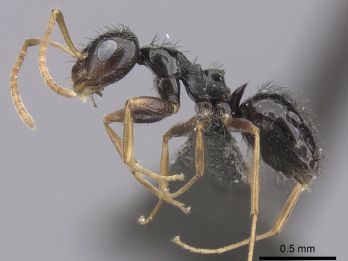African black sugar ant
Lepisiota incisa, known as the African black sugar ant, is a threat to our environment. It is not harmful to people or pets.
The African black sugar ant is a nationally significant pest under the National Environmental Biosecurity Response Agreement.
Background
This species is non-native to Australia and was unknown here until February 2020, when multiple detections were made in the Perth metropolitan area. All known infestations are under eradication.
The National Biosecurity Management Consultative Committee and the National Biosecurity Management Group have agreed that it is technically feasible and cost beneficial to eradicate from Western Australia.
Impacts
African black sugar ants demonstrate invasive characteristics with aggressive behaviours towards other ant species. They are known to outcompete native ants.
These ants are one of several invasive exotic ant species with the ability to form super colonies by establishing interconnected nests, with collaborative egg-laying queens. A single colony can spread for hundreds of square kilometres.
Once established, they may disrupt social, commercial, and agricultural activities.
Identification
African black sugar ants are a shiny dark brown ant, about 2–3 mm in length.
Visible under a hand lens or microscope, with thick blackish bristles is a pronounced spine between the thorax and abdomen. Its hairless legs are mostly yellow.
Habitat
African black sugar ants are highly likely to be suited to Australian conditions. They have potential to establish in a wide variety of habitats, including precious, undisturbed bush areas.
The ant has been known to harvest plastic and infest electrical boxes and components, causing damage to infrastructure.


